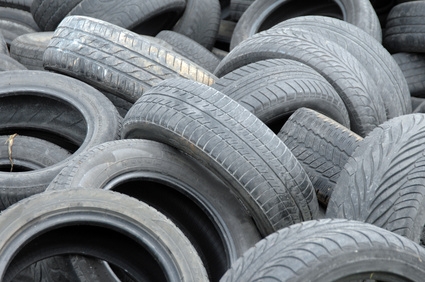
At one time, all tires were made exclusively of vulcanized rubber. Although pure rubber tires served their purpose at the turn of the century, increasing highway speeds, vehicle weights and changing expectations forced a change in thinking about tire composition. Modern tires contain so many different compounds that tires are hardly rubber at all any more, and some contain none at all.
Natural rubber is a very flexible substance that does a good job of gripping the road, but that's also part of the problem. Only that part of the rubber tire actually touching the road exerts any amount of load; the rest of the tire just stretches to accommodate it. This constant stretch-and-release creates heat on a molecular level, which quickly degrades the rubber and causes it to lose cohesion.
Modern tires contain as little as 14 percent actual rubber; the rest of the tire's structure is made up of carbon black, a petroleum distillate that helps enhance traction; silica, which makes the tire stiffer for increased longevity and fuel mileage; and silicone, which helps bind the carbon and silica together.
Although silicone's primary purpose is to hold the tire together, it also performs several important functions related to performance. Silicone exhibits far better mechanical adhesion than rubber, making it a valuable addition for ice, snow and rain-oriented tires. However, silicone is very soft and doesn't respond well to heat, which is why specific winter tires aren't recommended for year-round usage.
One of the only true alternatives to the rubber tire, urethane and polyurethane tires have been in development since the 1970s. Polyurethane is easier to make, offers less rolling resistance for better fuel economy and greater longevity. However, polyurethane is also very hard compared to rubber, which means that tires made of this synthetic polymer off very little in the way of traction.
Carbon black enhances the tire's strength resistance to wear but requires crude oil to produce and is extremely damaging to the environment after disposal. If you've ever seen pictures of the great 18-Day Tire Fire in Hagersville, Ontario, then you've seen what happens when petroleum interacts with natural rubber. One alternative currently under development is soy flour. Soy flour not only reduces the tire's environmental impact after disposal but also does so at every phase from production through the tire's expected lifespan.
Billed by manufacturer Yokohama as the world's most advanced tire, the dB Super E-Spec uses orange-oil infused rubber to enhance fuel economy and longevity. The orange oil serves to soften the natural rubber to enhance traction, which allows that manufacturer to use less petroleum-derived carbon black. Yokohama claims that its citrus-flavored tire offers all the benefits of a standard rubber tire but offers 20 percent less rolling resistance and low noise levels and is completely recyclable.